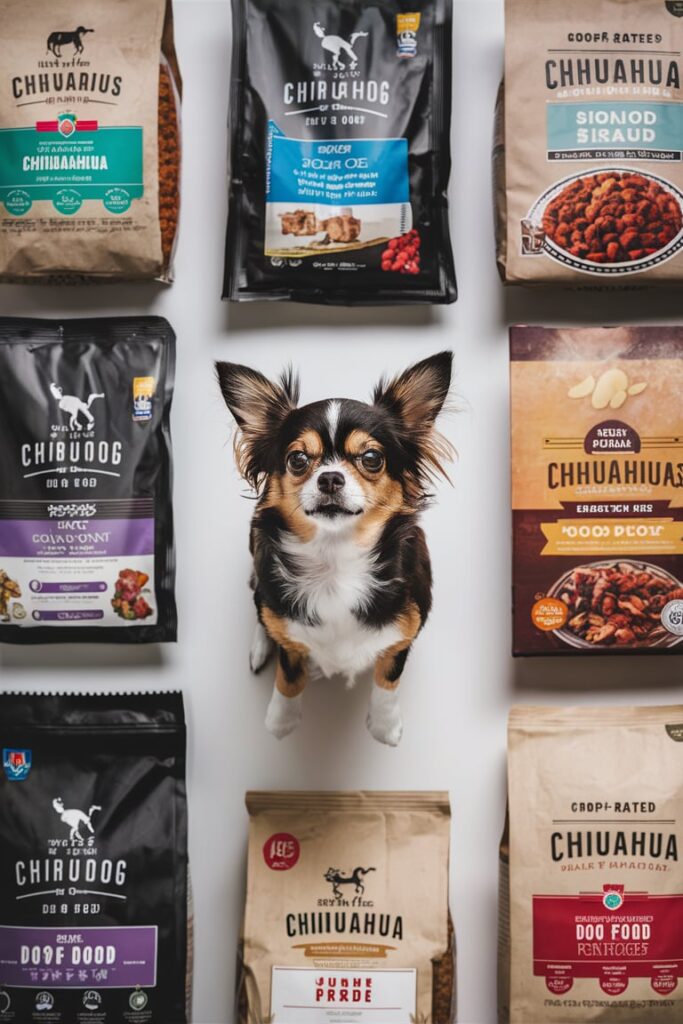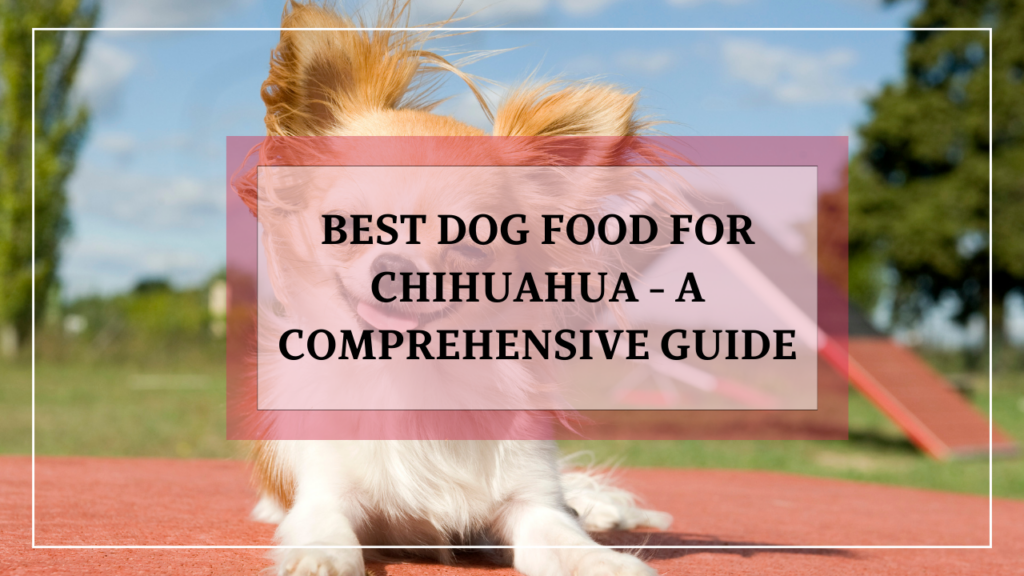Chihuahuas, with their unique size and personality, require specific dietary considerations to ensure they thrive. This comprehensive guide will walk you through everything you need to know about choosing the best dog food for your Chihuahua, addressing their specific nutritional needs, dietary preferences, and common health concerns.
Understanding Chihuahua Nutritional Needs

What Makes Chihuahuas Unique?
Chihuahuas are known for their small size, typically weighing between 2 to 6 pounds. This petite frame, while adorable, comes with specific challenges when it comes to feeding. Chihuahuas have a fast metabolism, which means they burn calories quickly and need a diet that provides them with consistent energy. However, because they are so small, even slight overfeeding can lead to obesity, which can exacerbate other health issues such as joint problems or heart disease.
Additionally, Chihuahuas are prone to dental issues, partly due to their small mouths. Dental disease is common among the breed, and their diet can play a crucial role in preventing or managing these problems. This means that you need to find a balance between a diet that provides enough nutrition without being too hard on their teeth.
Another unique trait of Chihuahuas is their tendency to be picky eaters. Their small stomachs and refined palates mean they may not eat everything you put in front of them, so it’s essential to find food that they not only tolerate but enjoy.
Essential Nutrients for Chihuahuas
To keep your Chihuahua healthy and energetic, their diet needs to be well-balanced and packed with essential nutrients:
- Protein: High-quality protein is crucial for muscle maintenance, especially for such a small breed. Look for foods that list meat as the first ingredient. Chicken, turkey, and fish are excellent sources.
- Fats and Omega Fatty Acids: Healthy fats, particularly omega-3 and omega-6 fatty acids, support skin health and a shiny coat. These nutrients are also vital for brain development, especially in puppies.
- Carbohydrates: While Chihuahuas don’t need a large amount of carbohydrates, a moderate amount can provide quick energy. Opt for complex carbs like sweet potatoes and brown rice, which offer sustained energy without causing spikes in blood sugar.
- Vitamins and Minerals: Key nutrients like calcium and phosphorus are vital for bone health, while vitamins such as Vitamin A and E support immune function. Ensure the food includes a balanced array of vitamins and minerals to support overall health.
- Fiber: Fiber aids in digestion and can help prevent constipation, which some Chihuahuas are prone to. Look for fiber-rich ingredients like pumpkin or beet pulp in their food.
How Age and Lifestyle Affect Diet
Your Chihuahua’s age and lifestyle significantly impact their dietary needs. Puppies, adults, and seniors all require different nutritional profiles.
- Puppies: During the first year of life, Chihuahuas need more protein and calories to support growth and development. Look for puppy-specific formulas that are rich in DHA, which supports brain development.
- Adults: Once your Chihuahua reaches adulthood, their calorie needs decrease, but they still require a balanced diet with high-quality protein and healthy fats. Ensure they get plenty of vitamins and minerals to maintain their health.
- Seniors: As Chihuahuas age, they may become less active, and their metabolism slows down. Senior dog foods often have fewer calories but are enriched with joint-supporting nutrients like glucosamine and chondroitin. Additionally, senior formulas are often easier to chew and digest.
For Chihuahuas with an active lifestyle—such as those who regularly engage in agility or other sports—you may need to increase their caloric intake slightly to match their energy expenditure. On the other hand, less active or sedentary Chihuahuas should have a more controlled diet to prevent weight gain.
Types of Dog Food for Chihuahuas

Wet Dog Food vs. Dry Dog Food
Choosing between wet and dry dog food for your Chihuahua can significantly impact their overall health and well-being. Both types of food offer unique benefits and drawbacks, so understanding the differences is key to making an informed decision.
Wet Dog Food is often considered more palatable, especially for picky eaters like Chihuahuas. The higher moisture content can help keep your Chihuahua hydrated, which is particularly important if they don’t drink much water on their own. Wet food also tends to be easier to chew, making it a good option for Chihuahuas with dental issues. However, wet food is typically more expensive than dry food and can spoil quickly once opened.
Best Wet Dog Food for Chihuahua:
- Look for high-quality wet food that lists meat as the first ingredient.
- Avoid foods with excessive fillers like corn or soy.
- Ensure the food contains balanced nutrients, including essential vitamins and minerals.
Dry Dog Food (kibble) has the advantage of being more convenient and cost-effective. Kibble helps maintain dental health by reducing plaque and tartar buildup, which is essential for Chihuahuas prone to dental issues. Additionally, dry dog food is easy to store and has a longer shelf life than wet food.
Best Dry Dog Food for Chihuahua:
- Choose kibble specifically designed for small breeds, with smaller pieces that are easier for Chihuahuas to chew.
- Ensure the first ingredient is a high-quality protein source.
- Look for added dental health benefits, such as kibble designed to clean teeth.
Grain-Free vs. Grain-Inclusive Diets
The debate between grain-free and grain-inclusive diets has gained momentum in recent years, with many pet owners wondering which is the better option for their Chihuahuas. Grain-free diets eliminate grains like corn, wheat, and soy, replacing them with alternative carbohydrates like sweet potatoes or lentils. These diets are often recommended for dogs with grain allergies or sensitivities.
When Grain-Free is Necessary: If your Chihuahua exhibits symptoms of grain sensitivity—such as itching, digestive issues, or skin problems—a grain-free diet may be beneficial. However, it’s essential to consult with your veterinarian before making the switch.
Grain-Inclusive Diets can still be an excellent choice for many Chihuahuas, especially those without specific grain allergies. Whole grains like brown rice and oats provide essential nutrients and fiber that contribute to overall health. Grain-inclusive diets can also be more cost-effective than grain-free options.
Ultimately, the decision between grain-free and grain-inclusive diets should be based on your Chihuahua’s specific needs and any guidance from your veterinarian.
Homemade vs. Commercial Dog Food
Homemade Dog Food allows you to have complete control over the ingredients, ensuring your Chihuahua gets exactly what they need. This can be particularly beneficial if your dog has allergies or sensitivities. However, creating a balanced homemade diet requires careful planning and the inclusion of all essential nutrients. If you’re considering homemade food, it’s advisable to consult with a veterinary nutritionist to ensure your Chihuahua’s diet is nutritionally complete.
Best Practices for Homemade Food:
- Include a high-quality protein source, such as chicken, turkey, or fish.
- Incorporate healthy fats, like fish oil or flaxseed, for coat and skin health.
- Add fiber-rich vegetables, such as sweet potatoes or pumpkin, to aid digestion.
- Use supplements to ensure your Chihuahua gets all necessary vitamins and minerals.
While homemade food offers customization, it can be time-consuming and more expensive in the long run.
Commercial Dog Food is convenient and specifically formulated to meet the nutritional needs of dogs. Top-rated commercial options for Chihuahuas often come with added benefits, such as kibble designed for dental health or formulas tailored to specific life stages.
Best Commercial Brands:
- Royal Canin Chihuahua Adult Dry Dog Food: Tailored kibble size, promotes dental health, and supports digestion.
- Blue Buffalo Life Protection Small Breed Formula: High-quality protein, grain-inclusive with whole grains, and added antioxidants.
- Wellness CORE Grain-Free Small Breed: High-protein, grain-free option with added nutrients for joint health.
Commercial dog food brands offer a range of options, making it easier to find a formula that suits your Chihuahua’s needs.
Common Health Issues in Chihuahuas and How Diet Can Help

Dental Problems
One of the most prevalent health issues in Chihuahuas is dental disease. Their small mouths can lead to overcrowded teeth, which increases the risk of plaque and tartar buildup. Left untreated, this can cause periodontal disease, tooth loss, and even infections that affect other organs.
Dietary Solutions:
- Dry Dog Food: Opt for kibble that promotes dental health. The mechanical action of chewing helps reduce plaque buildup.
- Dental Treats: Incorporate dental chews or treats that are specifically designed to clean teeth and freshen breath. Just ensure they’re appropriate for small breeds like Chihuahuas.
- Additives: Consider adding dental water additives or oral gels that can further help in maintaining oral hygiene.
Pro Tip: Regular brushing and dental check-ups are just as important as a dental-friendly diet.
Hypoglycemia
Hypoglycemia, or low blood sugar, is a common issue in small breeds like Chihuahuas. Because of their high metabolism, they can quickly burn through their energy reserves, leading to symptoms such as weakness, trembling, and even seizures.
Dietary Solutions:
- Frequent Meals: Feed your Chihuahua multiple small meals throughout the day rather than one or two large meals. This helps maintain stable blood sugar levels.
- High-Quality Carbohydrates: Include complex carbs in their diet, such as brown rice or sweet potatoes, which provide sustained energy and prevent rapid drops in blood sugar.
- Protein-Rich Snacks: Offering protein-rich snacks between meals can also help maintain energy levels and prevent hypoglycemia.
Obesity
Obesity is a significant concern for Chihuahuas, especially since even a small amount of excess weight can put strain on their joints and lead to other health problems like heart disease. Because of their small size, it’s easy to overfeed them without realizing it.
Dietary Solutions:
- Portion Control: Measure your Chihuahua’s food accurately and avoid free-feeding. Stick to recommended portion sizes based on their age, weight, and activity level.
- Low-Calorie Foods: If your Chihuahua is overweight, consider switching to a lower-calorie dog food that still provides the necessary nutrients. Foods labeled as “weight management” or “light” can be beneficial.
- Healthy Treats: Be mindful of treats, which can add up in calories quickly. Opt for low-calorie, healthy treats like carrots or green beans.
Tip: Regular exercise is also crucial in preventing and managing obesity in Chihuahuas.
Allergies and Food Sensitivities
Chihuahuas can be prone to food allergies or sensitivities, which may manifest as itching, gastrointestinal issues, or skin problems. Common allergens include grains, beef, dairy, and chicken.
Dietary Solutions:
- Limited Ingredient Diets: If you suspect your Chihuahua has a food allergy, try a limited ingredient diet that includes only a few ingredients, making it easier to pinpoint the allergen.
- Novel Proteins: Consider introducing novel protein sources like venison or duck, which are less likely to trigger allergies.
- Grain-Free Options: For Chihuahuas with grain sensitivities, grain-free diets can help alleviate symptoms.
Note: Always consult your veterinarian before making significant changes to your Chihuahua’s diet, especially if you suspect allergies.
Joint Problems
Joint issues, such as patellar luxation and arthritis, are relatively common in Chihuahuas, particularly as they age. Maintaining a healthy weight and providing joint-supporting nutrients can help manage these conditions.
Dietary Solutions:
- Glucosamine and Chondroitin: Look for foods that contain glucosamine and chondroitin, which are natural compounds that support joint health.
- Omega-3 Fatty Acids: These fatty acids, often found in fish oil, have anti-inflammatory properties that can help reduce joint pain and stiffness.
- Calcium and Vitamin D: Ensure your Chihuahua’s diet includes adequate calcium and vitamin D to support strong bones and joints.
Consider: Supplements like fish oil or joint-support chews can be added to their diet for extra support.
Heart Disease
Chihuahuas are also at risk for heart disease, particularly mitral valve disease. Diet plays a crucial role in managing heart health.
Dietary Solutions:
- Low-Sodium Diet: If your Chihuahua has been diagnosed with heart disease, a low-sodium diet can help prevent fluid retention and reduce the strain on their heart.
- Heart-Healthy Nutrients: Look for foods enriched with omega-3 fatty acids, taurine, and L-carnitine, all of which support heart health.
- Weight Management: Keeping your Chihuahua at a healthy weight is essential for reducing the burden on their heart.
Recommended Brands of Dog Food for Chihuahuas

Choosing the right brand of dog food for your Chihuahua can be challenging, given the sheer number of options available. Here, we’ll explore some of the top brands that are highly recommended for Chihuahuas based on their nutritional content, quality of ingredients, and specific benefits tailored to small breeds. These brands offer a range of options that cater to the unique dietary needs of Chihuahuas.
1. Royal Canin Chihuahua Adult Dry Dog Food
Why It’s Great for Chihuahuas:
- Breed-Specific Formula: Royal Canin has developed a formula specifically tailored for Chihuahuas, taking into account their small size, delicate digestive systems, and dental health needs.
- Kibble Size: The kibble is designed to be small and easy for Chihuahuas to chew, which is crucial given their tiny mouths and tendency towards dental issues.
- Digestive Support: This formula includes highly digestible proteins and a blend of fibers that support healthy digestion, reducing the risk of stomach upset and promoting regular bowel movements.
Nutritional Highlights:
- Protein: 28%
- Fat: 16%
- Fiber: 3.4%
- Added Nutrients: EPA and DHA for healthy skin and coat.
Customer Reviews: Many Chihuahua owners report that this food significantly improves their dogs’ coat quality and overall health. The breed-specific approach ensures that even the pickiest eaters find it palatable.
2. Blue Buffalo Life Protection Formula Small Breed
Why It’s Great for Chihuahuas:
- High-Quality Ingredients: Blue Buffalo emphasizes real meat as the first ingredient, ensuring your Chihuahua gets the protein they need for muscle maintenance and energy.
- LifeSource Bits: This formula includes Blue Buffalo’s exclusive LifeSource Bits, a blend of antioxidants, vitamins, and minerals carefully selected by veterinarians and animal nutritionists to support immune health, oxidative balance, and life stage requirements.
- Small Breed Focus: The small kibble size and balanced calorie content make it ideal for Chihuahuas who need nutrient-dense food without excess calories that could lead to weight gain.
Nutritional Highlights:
- Protein: 26%
- Fat: 15%
- Fiber: 4%
- Added Nutrients: Glucosamine and chondroitin for joint health.
Customer Reviews: Chihuahua owners appreciate the natural ingredients and the focus on quality. Many note improvements in their dogs’ energy levels, coat health, and overall well-being.
3. Hill’s Science Diet Adult Small Paws
Why It’s Great for Chihuahuas:
- Tailored for Small Breeds: Hill’s Science Diet Small Paws is specifically formulated for small and toy breeds, making it an excellent choice for Chihuahuas. The small kibble is easy for them to eat, and the balanced nutrition supports their unique needs.
- Veterinarian Recommended: This brand is often recommended by veterinarians due to its focus on science-based nutrition and quality control.
- Skin and Coat Health: The formula includes omega-6 fatty acids and vitamin E, which are essential for maintaining healthy skin and a shiny coat.
Nutritional Highlights:
- Protein: 24%
- Fat: 16%
- Fiber: 4%
- Added Nutrients: Antioxidants for immune support and calcium for bone health.
Customer Reviews: Owners of small dogs, particularly Chihuahuas, often report that their pets have shinier coats and more energy after switching to Hill’s Science Diet. The brand’s reputation for quality and consistency is a big draw.
4. Wellness CORE Grain-Free Small Breed
Why It’s Great for Chihuahuas:
- Grain-Free Formula: For Chihuahuas with grain sensitivities, Wellness CORE offers a grain-free option that still provides balanced nutrition.
- High Protein Content: This formula is rich in high-quality protein from sources like turkey and chicken, which helps maintain lean muscle mass.
- Joint Health Support: Wellness CORE includes glucosamine and chondroitin, which are vital for joint health, especially in small breeds prone to joint issues.
Nutritional Highlights:
- Protein: 36%
- Fat: 15%
- Fiber: 5%
- Added Nutrients: Omega fatty acids for skin and coat health, and probiotics for digestive health.
Customer Reviews: Wellness CORE is highly rated for its high protein content and grain-free formulation. Many Chihuahua owners note improvements in their dog’s digestion and muscle tone, making it a popular choice for active Chihuahuas.
5. Nutro Ultra Small Breed Adult
Why It’s Great for Chihuahuas:
- Superfood Blend: Nutro Ultra combines high-quality protein with a blend of 15 superfoods, including chia seeds, kale, and blueberries, to provide a nutrient-rich diet.
- Small Breed Focus: Designed specifically for small breeds, the kibble size and calorie content are optimized for Chihuahuas.
- No Artificial Preservatives: This formula avoids artificial colors, flavors, and preservatives, making it a more natural choice for your pet.
Nutritional Highlights:
- Protein: 27%
- Fat: 16%
- Fiber: 4%
- Added Nutrients: Antioxidants for immune support, and omega fatty acids for skin and coat health.
Customer Reviews: Chihuahua owners appreciate the quality of the ingredients and the inclusion of superfoods. The natural approach to nutrition without artificial additives makes this brand a favorite among health-conscious pet owners.
How to Transition Your Chihuahua to a New Dog Food
Changing your Chihuahua’s diet requires careful planning to ensure a smooth transition and to avoid any digestive upset. Sudden changes in diet can lead to gastrointestinal issues such as diarrhea or vomiting. Here’s a step-by-step guide on how to transition your Chihuahua to a new dog food:
1. Gradual Introduction
Start Slowly: Begin by mixing a small amount of the new food with your Chihuahua’s current food. A gradual introduction helps your dog’s digestive system adjust to the new food without causing discomfort.
Recommended Transition Period: Aim to transition over a period of 7 to 10 days. This timeframe allows your Chihuahua’s digestive system to adapt gradually. If your Chihuahua shows signs of digestive upset, extend the transition period to 14 days.
2. Gradual Ratio Adjustment
Day 1-3: Mix 25% of the new food with 75% of the old food. This small amount of new food helps to introduce the new flavors and ingredients without overwhelming your Chihuahua’s digestive system.
Day 4-6: Increase the ratio to 50% new food and 50% old food. This balanced mix ensures that your Chihuahua gets used to the new food while still having the familiar old food.
Day 7-10: Transition to 75% new food and 25% old food. This further adjustment helps your Chihuahua get used to the new food as the old food is phased out.
Day 11-14: Feed 100% new food. By this point, your Chihuahua should be fully transitioned to the new diet.
3. Monitor Your Chihuahua’s Health
Watch for Signs of Digestive Issues: Keep an eye out for any signs of digestive upset, such as diarrhea, vomiting, or constipation. If these symptoms persist, consider slowing down the transition process or consulting your veterinarian.
Check for Allergic Reactions: Look for signs of allergies, such as itching, swelling, or changes in skin condition. If you notice any of these symptoms, it may be necessary to try a different food or consult with your veterinarian.
Observe Overall Health: Monitor your Chihuahua’s energy levels, coat condition, and weight to ensure that they are adjusting well to the new food. A healthy transition should lead to improved overall health and vitality.
4. Adjust Portions as Needed
Follow Feeding Guidelines: Refer to the feeding guidelines provided by the new food manufacturer to determine the appropriate portion sizes for your Chihuahua’s weight and age.
Adjust for Activity Level: If your Chihuahua is more or less active than usual, you may need to adjust their portion sizes accordingly.
Regular Weigh-Ins: Regularly weigh your Chihuahua to ensure they are maintaining a healthy weight with the new food. Adjust their portions if needed to keep their weight in check.
5. Seek Professional Advice
Consult Your Veterinarian: If you have any concerns about the transition process or if your Chihuahua has specific health issues, it’s always a good idea to consult your veterinarian. They can provide personalized advice based on your Chihuahua’s unique needs.
Consider a Veterinary Nutritionist: For Chihuahuas with complex health issues or dietary needs, a veterinary nutritionist can offer specialized guidance and create a customized diet plan.
FAQs About the Best Dog Food for Chihuahuas
1. What is the best type of dog food for Chihuahuas?
Answer: The best type of dog food for Chihuahuas depends on their specific needs, but high-quality commercial dog foods that are tailored for small breeds generally work well. Look for foods that offer:
- Breed-Specific Formulas: These are designed to meet the unique needs of Chihuahuas.
- High-Quality Proteins: Ensure the first ingredient is a named meat source.
- Small Kibble Size: Small kibble is easier for Chihuahuas to chew and digest.
- Nutritional Balance: Choose foods with balanced proteins, fats, vitamins, and minerals.
2. How much should I feed my Chihuahua?
Answer: The amount of food to feed your Chihuahua depends on their age, weight, activity level, and metabolism. Generally:
- Puppies: Follow the feeding guidelines on the food packaging for puppies, which are usually based on weight.
- Adults: Most Chihuahuas need about 1/4 to 1/2 cup of dry food per day, divided into two meals. Adjust portions based on your Chihuahua’s activity level and body condition.
- Seniors: Older Chihuahuas may need fewer calories, so adjust their food intake to maintain a healthy weight.
3. Can I mix homemade food with commercial dog food for my Chihuahua?
Answer: Yes, you can mix homemade food with commercial dog food, but it’s important to ensure that the combination provides balanced nutrition. When doing so:
- Gradual Transition: Introduce new foods gradually to avoid digestive upset.
- Balance: Ensure that the homemade food complements the commercial food, so your Chihuahua receives all necessary nutrients.
- Consult a Vet: Consider consulting a veterinarian or a pet nutritionist to create a balanced diet plan.
4. What should I do if my Chihuahua is a picky eater?
Answer: If your Chihuahua is a picky eater, try the following strategies:
- Variety: Offer a variety of high-quality dog foods to find one that your Chihuahua likes.
- Warm Up Food: Warming up food can enhance its aroma and appeal.
- Mix in Toppers: Add a small amount of dog-friendly toppers like plain yogurt or a bit of cooked meat to entice your Chihuahua.
- Regular Feeding Schedule: Establish a regular feeding routine and avoid leaving food out all day.
5. Is grain-free dog food better for Chihuahuas?
Answer: Grain-free dog food can be beneficial for Chihuahuas with grain allergies or sensitivities. However, it’s not necessarily better for all Chihuahuas. Consider the following:
- Allergies: If your Chihuahua shows signs of a grain allergy, grain-free options can help.
- Balanced Diet: Ensure that the grain-free food still provides a balanced diet with essential nutrients.
- Consult a Vet: Always consult with a veterinarian before making dietary changes to ensure that the food meets your Chihuahua’s specific needs.
6. How often should I feed my Chihuahua?
Answer: Adult Chihuahuas should generally be fed twice a day—once in the morning and once in the evening. Puppies may require more frequent feedings, typically three to four times a day. Consistent feeding schedules help regulate digestion and maintain a healthy metabolism.
7. Can I feed my Chihuahua human food?
Answer: While some human foods are safe for Chihuahuas, others can be harmful. Safe options include:
- Cooked Lean Meats: Chicken, turkey, or beef (without seasoning or bones).
- Vegetables: Carrots, green beans, or peas.
- Fruits: Apples (without seeds), blueberries, or bananas.
Avoid feeding:
- Chocolate, grapes, and onions: These are toxic to dogs.
- Rich or fatty foods: These can lead to digestive issues or pancreatitis.
Always consult your veterinarian before introducing new human foods into your Chihuahua’s diet.
8. How can I tell if the dog food I’m using is good for my Chihuahua?
Answer: To determine if your dog food is suitable for your Chihuahua, look for:
- Nutritional Adequacy Statement: Ensure it meets AAFCO standards.
- Ingredient Quality: Check that high-quality proteins are listed as the first ingredients and avoid foods with excessive fillers or by-products.
- Positive Health Indicators: Monitor your Chihuahua’s coat condition, energy levels, and overall health. If your dog is thriving and not experiencing digestive issues, the food is likely a good choice.

Hi, I’m Ali Tarek, the founder of Animalsman. I’ve always been passionate about pets, especially dogs and cats, and I created this website to share practical tips, easy recipes, and helpful care advice for fellow pet lovers. My goal is to make pet care simple, enjoyable, and accessible for everyone. When I’m not writing or curating content, you’ll usually find me spending time with my furry friends or learning new ways to keep them happy and healthy.



